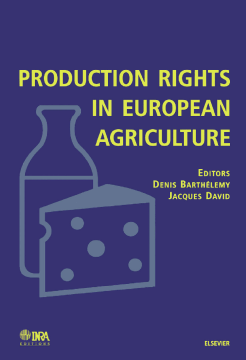
Additional Information
Book Details
Abstract
Rather than simply cataloging the various interpretations of European regulations by Member States, this international team examines the economic priorities, the legal bases, the social norms and cultural patterns which come into play, presenting an analytical approach to the study of production rights in European agriculture.
This work traces the emergence and the economic and legal content of the different income support tools for agricultural producers, collectively termed 'production rights' and it looks at the foundations of the specific national conceptions underlying the methods of organising agricultural activity.
The book is intended for a varied readership: farmers themselves, of course, but also economic, legal and tax consultants, experts, lawyers, notaries, as well as students, teachers and researchers. It has been set out in such a way as to allow readers to move freely from one subject to another, depending on whether their interest lies in economic aspects or legal developments, or whether they are more concerned by certain production rights or by certain features of their own organisation.
The goal of the book is to enable the reader to grasp the special features and the significance of the forces which have shaped the current income support instruments for producers in the various Member States of the EU, and which will unquestionably continue to influence the measures which flow from reforms to the Common Agricultural Policy in the years to come.
G. Whittaker
...There is no doubt in my mind that this book will enthral anyone who is interested in exploring beyond the how to the why of production right function and administration. That we should all understand the how is beyond debate, in my opinion; I have discovered from other writings and in my brief acquaintance with this book that a greater knowledge of the why can help to put the how in perspective, I will certainly revisit this compilation regularly. The contributions, while being solidly and academically written, not to say exceptionally well thought out, are light enough in style for an interested person to be able to dip into this book over coffee, on the train or even as bedtime reading! ...it is an ideal vehicle for those who wish to take their knowledge of the CAP and its workings to a higher level.
The Bulletin of the Agricultural Association, Issue 27
